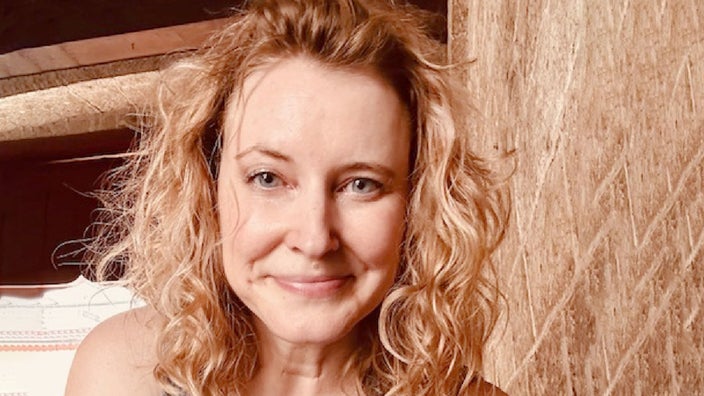What Is It Like to Have Metastatic Breast Cancer? Hear From Someone Taking HER2 Blockers
By Chris Kenning | GoodRx
Key takeaways:
- Metastatic breast cancer is when a cancer has spread to other parts of the body.
- Christine Hodgdon knows both its daunting challenges and hopeful treatments.
- She now advocates for research and other cancer patients.

GoodRx
In 2014, Christine Hodgdon’s life seemed to be falling into place in the 4 years since her father died of a rare cancer.
She spent 2 years as a Peace Corps volunteer in Guatemala, and upon her return, landed a job as a conservation biologist. She had a boyfriend and was running half-marathons. Best of all, her family was healing from their loss.
That spring, however, it all fell apart. Christine, at age 34, was diagnosed with stage 4 metastatic breast cancer, meaning it had already spread from the breast, in her case to her lung.
It was devastating news. She knew it wasn’t curable.
In her journey through a daunting array of challenges, Christine would find herself among those for whom treatment, including HER2-positive protein blockers, can control such cancers for a number of years, according to the National Breast Cancer Foundation.
And she found a new calling in patient advocacy, employing her hard-won knowledge of what it’s like to survive metastatic breast cancer to help people navigate it and expand research into new treatments.
But getting there wasn’t easy.
Navigating the challenges of a cancer diagnosis
It began when she found two lumps in her right breast.
Her provider said the lumps were unlikely to be cancerous given her young age and no family history of breast cancer. Seven months later, however, a biopsy showed that they were indeed breast cancer.
“Then, we had to do a scan to determine if the cancer had spread,” she recalls.
According to the Breast Cancer Research Foundation, about 30% of women diagnosed with early-stage breast cancer develop metastatic cancer, which is when it has spread from where they started — often to the lungs, liver, bones, or brain.

Christine’s scan revealed she had a spot on her lung, which was biopsied and later found to be HER2-positive breast cancer. The spot had a higher-than-normal amount of a protein called HER2 that causes cancers to grow and spread more aggressively.
“It was really scary,” says Christine, who was also sad, angry, and uncertain. “I didn’t know what the prognosis was. But when you look it up for a metastatic breast cancer patient, it’s like 1 to 3 years. I just assumed I was probably not going to live.”
Discovering the power of targeted treatments
She was soon receiving a battery of treatments — both familiar and unfamiliar.
“I had a crash course because of my dad. So I knew about cancer. I knew about surgery and chemo and radiation,” she says. But she learned there were others, too.
That included infusions of Perjeta (pertuzumab) and Herceptin (trastuzumab) — monoclonal antibodies that would target the HER2 protein and keep it from fueling growth.
She was also on hormone therapy because her cancer was positive for estrogen and progesterone receptors.
All told, the treatments meant plenty of side effects.
“There was a lot going on. I had diarrhea, hair loss, fatigue, mouth sores, and all these things. And then once I dropped the chemo, my hair started to come back, the mouth sores went away,” she says, mentioning just a few.
She had watched her father’s condition only worsen with his cancer. But the intense treatment she was undergoing began to give her hope. As the months ticked by, she kept getting stronger, and was even able to exercise while on chemotherapy.
“I assumed that the medications weren’t going to work, and I wasn’t going to live. But then, slowly, I started doing well,” she says.
Then came good news from a scan.
“After 4 months of chemo and Herceptin and Perjeta, I was clear. I had no evidence of disease,” she says.
Eight years later, that’s still the case.
Empowering others with metastatic breast cancer
Christine counts herself lucky. But she also credits ongoing treatments.
That includes hormone therapy, which can cause joint pain and hot flashes, and infusions of trastuzumab, which require heart checks to make sure it doesn’t cause cardiac problems. She also has some fatigue and joint pain.
“For metastatic patients, you’re never done,” she says. “You’re on treatment forever. So, that’s very challenging.”
Her life has changed in a number of ways. She says her diagnosis and treatment led her relationship to dissolve and forced her to stop running half-marathons. She went on disability after giving up her job.
But her experience has also forged a new passion to become an advocate, getting involved in an array of programs.
That included co-founding GRASP, or Guiding Researchers and Advocates to Scientific Partnerships, which connects patients, clinicians, and researchers to help speed the development of new therapies.
“I just felt like there was nobody really, there was nobody really connecting patients to research and to researchers,” says Christine, who’s now 43 and living in Baltimore.
Her difficult journey has helped her offer guidance for other patients. Among her advice: Always get a second opinion, find support groups online, and realize there are a growing number of medications that can help. And she tells family and friends to focus on empathy and compassion in talking with cancer patients.

After surviving metastatic breast cancer, Christine Hodgdon began to advocate for others.
Today, she also focuses on living each day to the fullest, recently returning from a weeks-long scuba diving trip to the Philippines.
There’s still uncertainty about what lies ahead. She knows that at any time the medications could stop working, and she could have progression, she says. But she’s also hopeful and focused on the present moment.
“I’m very optimistic by nature,” she says. “So, I’m cautiously optimistic.”



